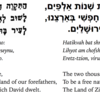3: Poetry excerpts, "Hatikvah" in different versions, Hebrew with English translation.
Most of the refrain that Imber wrote in his poem "Tikovseynu" differs from the version of "Hatikvah" sung today as the national anthem of Israel. This source sheet presents the refrain as Imber wrote it and the refrain as it is sung today, in both the original Hebrew (with transliteration) and English translation. As seen in resource 2, the version that Imber wrote was still being sung as the Zionist anthem around the world even into the mid-1930s, and would be sung this way, especially in the Diaspora, up until the establishment of the State of Israel in 1948.
Meanwhile, the Jewish communities in Palestine had been singing the newer refrain for decades. Its lyrics, which have a somewhat more secular flavor omitting Imber’s references to King David, are attributed to Yehuda Leib Matmon-Cohen, an educator who settled in Ottoman-ruled Palestine in 1905. With the founding of the state in 1948, and the unofficial proclamation of "Hatikvah" as its anthem that same year, this version of the refrain was universally adopted.
Suggested Activities: First, ask students to try to sing Imber's words to the tune of the anthem's refrain. How does it sound to them, and do they like its aural qualities more or less than the more familiar version? Might there have been musical reasons for the lyric revision that took place? What else might explain the changes that were introduced? What is emphasized in Imber's version, and how does it differ from what is emphasized in the official version sung today? Why might the founders of the young and controversial State of Israel have preferred their version?
Sources: Text of Imber's version: Naphtali Herz Imber, "Hatikvah," in Kol shirei naftali hertz imber (Complete Poetry of Naphtali Herz Imber) (Tel Aviv: M. Newman, 1950), 24.
Text of version sung today: "Hatikva - National Anthem of the State of Israel," The Knesset, 2009, <https://www.knesset.gov.il/holidays/eng/hatikva_eng.htm>, accessed March 1, 2019.
Translations and source sheet by Mikhl Yashinsky (New York, 2019).

